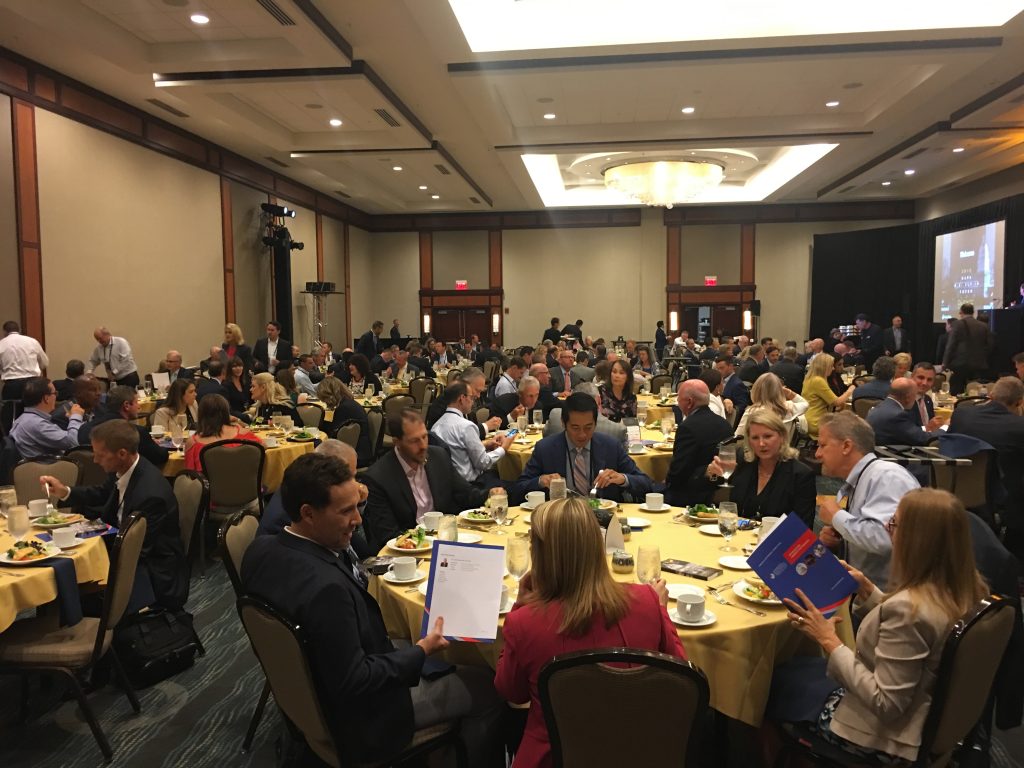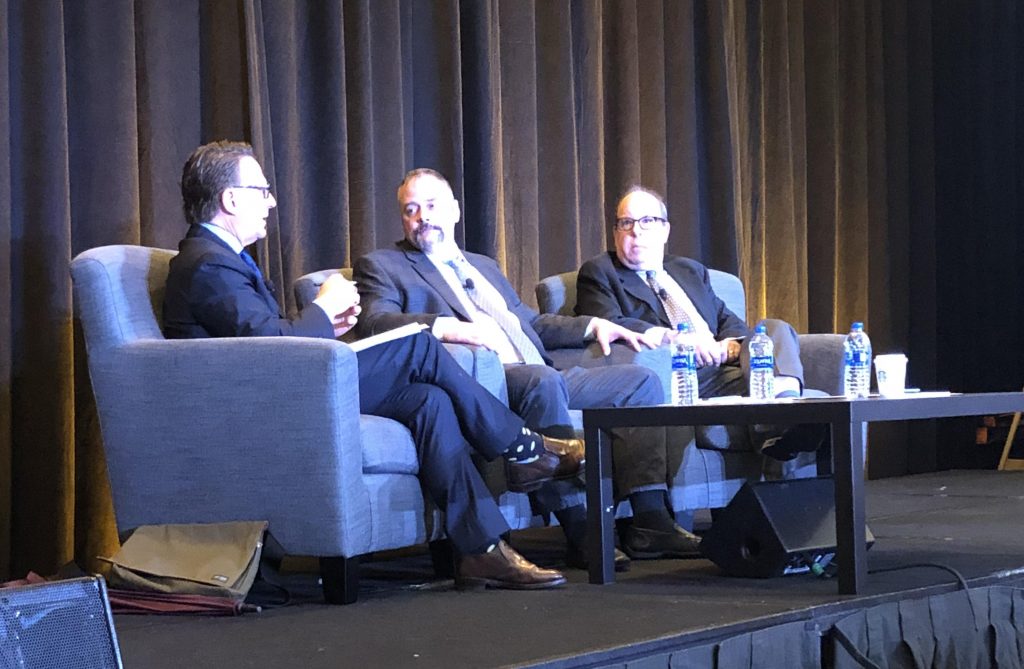Nearly 250 delegates descended on Capitol Hill July 24 to attend NAPA’s sixth annual DC Fly-In Forum, where they heard directly from key lawmakers, regulators and industry experts, and participated in meetings with House and Senate staffers.
Kicking off the first day of the two-day forum was Rep. Richie Neal (D-MA), the ranking Democrat on the House Ways & Means Committee, and a man who could become Chairman of that powerful committee should the Democrats retake the House following the mid-term elections. Among other things, Neal reviewed two key bills that he introduced late last year: the Retirement Plan Simplification and Enhancement Act (RPSEA) and the Automatic Retirement Plan Act (ARPA).
RPSEA aims to modify the current automatic enrollment safe harbor and establish a new automatic safe harbor, which includes changes to minimum default contributions, matching contributions and a special tax credit. The more provocative ARPA would require employers to maintain a 401(k) or 403(b) plan that covers all eligible employees, exempting small employers, governments, churches and businesses not in existence for three years. The bill also allows for multiple employer plans (MEPs) and increases the start-up credit for small employers.
Neal acknowledged that his ARPA proposal does include a mandate, and that it can be a hard sell for both caucuses, but said he believes that the parties are amenable to moving in that direction.
In pushing his legislation, Neal cited statistics that 55 million workers currently are not in a retirement plan, noting that, for many of these individuals, Social Security is going to be their sole source of support during their retirement years. Moreover, he suggested that many small businesses would like to provide retirement plans, but that it’s particularly difficult for them to do so.
[caption id="attachment_83137" align="aligncenter" width="604"] NAPA Fly-In Welcome luncheon[/caption]
NAPA Fly-In Welcome luncheon[/caption]
“If you’re wondering about how I try to convince Republicans that they should support my plan, I say to them: life insurance agents, community bankers and credit unions would jump at the prospect of selling small plans.”
But Neal directed some criticism towards managers of large plans, who he said “show limited interest in offering support for those on small side, but those are the people we have to figure out how to get in to the retirement system on a sustained basis.” Neal explained that he understands there’s not a lot of money to be made by managing small accounts, but believes his legislation will provide some room for those groups that are eager to sell to the small market.
Neal also suggested that, given the increases in life expectancy, he believes annuities are going to need to be part of the policy conversation to enhance retirement savings. At the same time, he suggested that sellers of annuities will need to be more professional in their application, emphasizing that it’s harmful to the overall policy discussion when you hear bad stories about annuities.
A common theme throughout the forum’s first day was whether there is the political will in Congress to act on legislation in an election year and whether time would permit any such activity.
To that end, Neal noted that he believes there are several retirement policy bills that could be enacted this year, including his RPSEA and ARPA, as well as the bipartisan Retirement Enhancement and Savings Act (RESA).
Bipartisan Approach
Fly-In Forum delegates also heard from Sen. Todd Young (R-IN), a member of the Senate Health, Education, Labor and Pensions Committee, about the bipartisan legislation he just introduced with Sens. Cory Booker (D-NJ), Tom Cotton (R-AR) and Heidi Heitkamp (D-ND) that seeks to expand access to workplace plans and enable individuals to build emergency savings.
Like Neal, Young cited Labor Department statistics that 40 million Americans do not have access to any workplace retirement plan, representing nearly a third of all private-sector workers. “Retirement security is a concern and is consistently raised as a major issue among small business owners and rank-and-file workers, and that’s why I’m working on this — it’s an emerging bottom-up issue,” he explained.
Young highlighted leakage as one issue that he is concerned about, particularly as it relates to people who are not able to address unexpected costs and end up tapping their retirement savings. He cited a Federal Reserve study showing that 40% of adults could not cover a $400 emergency expense. The Strengthening Financial Security through Short-Term Savings Act that Young cosponsored with the three other senators seeks to alleviate this issue by limiting early withdrawals from retirement accounts and by allowing employers to set up automatic contribution arrangements for their workers in emergency savings accounts.
Young also explained how his Retirement Security Flexibility Act (S. 3221) seeks to modernize the use of automatic enrollment and automatic escalation, as well as allow small business employers to satisfy safe harbor contribution requirements even if they don’t contribute.
He suggested that the “quickest and easiest fix” to address the retirement system’s shortcomings would be to pass RESA, noting that he believes it should be passed and signed into law by the end of the year. Young also said he believes there are other changes that could be made at the same time.
“We in Congress don’t have all the answers. And I think Congress should have some legislative humility to look to industry stakeholders to determine what works and what doesn’t work in crafting new policies,” he noted. That’s why he and Booker cosponsored legislation to create a commission to review the current DB and DC models and societal trends to develop recommendations to improve the system, Young explained.
[caption id="attachment_83138" align="alignnone" width="600"] Doug Fisher- Moderator (Left), Drew Crouch- Panelist (Center), Chris Allen- Panelist (Right) U.S. Senate Finance Committee Panel discussion. NAPA Fly-In July 23, 2018.[/caption]
Doug Fisher- Moderator (Left), Drew Crouch- Panelist (Center), Chris Allen- Panelist (Right) U.S. Senate Finance Committee Panel discussion. NAPA Fly-In July 23, 2018.[/caption]
Senate Finance Panel
Chris Allen, Senior Advisor for Benefits under Senate Finance Committee Chairman Orrin Hatch (R-UT), along with Drew Crouch, Senior Tax and ERISA Counsel under Senate Finance Committee ranking Democrat Ron Wyden (OR), participated in a panel discussion where they shared their personal insights on what is likely to come out of Congress.
Both Allen and Crouch noted that they have spent a lot of time lately working on multiemployer plan issues, but they believe that RESA can be enacted this year, if the legislation can overcome extraneous political issues.
They also noted that House Ways & Means Committee Chairman Brady’s recent focus on “Tax Reform 2.0” provides an opening for discussions on a retirement bill, but the overall shape of the legislation and its cost will be big determining factors of whether it could make it through the Senate.
Delegates Take the Hill
Meanwhile, following a day of legislative, regulatory and litigation updates, Fly-In Forum delegates blanketed Capitol Hill for meetings with lawmakers and staff. The nearly 250 delegates met with lawmakers and staff in both the House and Senate to advocate for passage of RESA, noting that the legislation is a bipartisan package of retirement policy proposals that will help small businesses adopt DC plans and give sponsors of existing plans added flexibility in administering their plans.
The delegates also urged policymakers to consider a proposal to permit employers to add health savings accounts (HSAs) to their 401(k) plans as a way to access lower cost investing and provide the ability to integrate both accounts into an employee’s financial planning.
Allowing electronic delivery as a default medium for all required retirement plan information disclosures to participants and beneficiaries was also a key message to Capitol Hill lawmakers. Noting that the current regulations make no sense and cost retirement plan participants hundreds of millions of dollars per year in lost savings, the delegates urged support for legislation that permits electronic disclosure as the default method. Absent a legislative fix, they asked policymakers to weigh in with the Department of Labor to update the rules.

